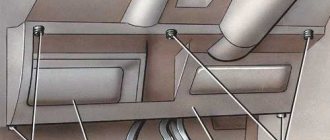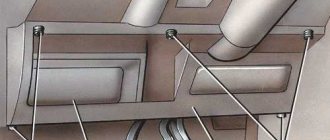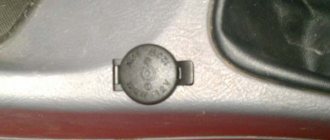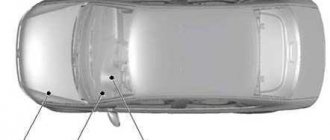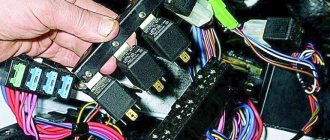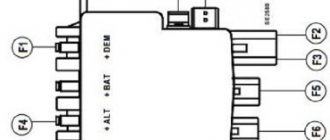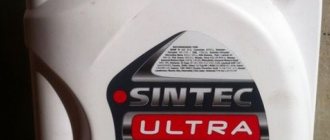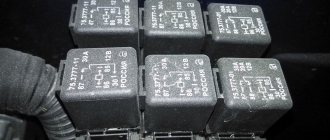The Hyundai Getz subcompact car was produced in 2002, 2003, 2004, 2005, 2006, 2007, 2008, 2009, 2010 and 2011. During this time, the model was restyled, although some call it the second generation. In this publication you will find a description of fuses and relays of the Hyundai Getz with block diagrams and their locations. Note the fuse responsible for the cigarette lighter.
The design of the blocks and the purpose of the elements in them may differ and depend on the type of engine and level of equipment of your Hyundai Getz. Check the description with the diagrams on the back of the protective cover.
Fuse and relay box in the engine compartment
In the Hyundai Getz it is located between the left fender, the starter battery and the air filter housing.
The fuse diagram and its explanation are given below.
Fuse diagram under the hood. Scheme printed on the lid
Fuses and fuses
| Number in photo | Denomination, A | Protected circuit |
| 8 | 10 | Air conditioner |
| 9 | 10 | Sound signal |
| 10 | 15 | Engine ECU; Injectors; Sensors: -camshaft position; - crankshaft position. Idle air control; Canister purge solenoid valve |
| 11 | 50 | Electric power steering |
| 15 | 10.15 | Reserve |
| 16 | 40 | ABS ECU; |
| 17 | 20 | Air bleed connector |
| 18 | 20 | Generator |
| 19 | 10 | Air conditioner; Fuel pump; Immobilizer antenna unit; Oxygen concentration sensor; Fuel pump; Air conditioner |
| 20 | 10 | Fuel pump; ECU |
| 21 | 10 | ABS ECU; Air bleed connector |
| 22 | 50 | Tail lights; Fuses No. 11, 19, 20, 25, 27, 29 of the cabin unit |
| 24 | 20 | Automatic fuel cut-off switch |
| 26 | 30 | Egnition lock; Starter |
| 27 | 30 | Egnition lock |
Relay
| Number in photo | Serviced chain |
| 1 | Interior heater fan |
| 2 | Turning on the engine cooling fan at high speed |
| 3 | Turning on the engine cooling fan at low speed |
| 4 | Starter |
| 5 | Air conditioner |
| 6 | Sound signal |
| 7 | Fuel pump |
| 12 | Power windows |
| 13 | Interior heater fan |
| 14 | Security alarm |
| 23 | Radiator cooling fan |
| 25 | Fuel pump; Generator; ECU |
| 30 | Electronic Engine Control Power Supply |
Technical characteristics of Hyundai Getz
The Hyundai Getz was produced with gasoline engines, but for Europe there was one diesel option available (we will not consider it in this manual on electrical equipment), all power units are 4-cylinder:
Hyundai Getz 1.1i (SOHC)
- The exact engine capacity is 1086 cm3;
- Valves - 12;
- Maximum power - 66 hp, 48.5 kW, 5500 rpm;
- Maximum speed - 154 km/h;
- Transmission - 5 speed manual transmission;
- Acceleration from 0 to 100 km/h - 15.6 seconds;
- Fuel consumption per 100 km/h (city / highway / combined cycle), liters - 6.9 / 4.7 / 5.5;
- Total weight - 1440 kg.
Hyundai Getz 1.3i (SOHC) - 2002-2005
- Engine capacity - 1341 cm3;
- Valves - 12;
- Maximum power - 82 hp, 60.2 kW, 5500 rpm;
- Maximum speed - 163 km/h;
- Transmission - 5 speed Manual transmission or 4 speed automatic transmission;
- Acceleration from 0 to 100 km/h (manual / automatic) - 11.5 / 14.8 s;
- Fuel consumption with manual / automatic at 100 km/h, l - 7 / 9 (urban cycle), 5 / 5.6 (suburban cycle), 5.7 / 6.9 (combined cycle);
- Total weight - 1530 kg.
Block in the cabin
It is hidden behind a plastic cover in the upper left corner of the storage compartment on the driver's side of the instrument panel. There are fuses on the front side of the block and relays on the back side.
On the back of the cover there is a paper diagram of the location of the fuses in the Hyundai Getz. Photos and transcript are given in the table below.
Circuit breakers
| Designation | Rated current, A | Protected consumer circuits |
| 1 | 10 | Air conditioner switch |
| 2 | 10 | Parking light lamps on the left side of the car |
| 3 | 10 | Airbag |
| 4 | 10 | Audio system; Electric exterior mirrors |
| 5 | 10 | Automatic gear selector switch; Reversing light switch |
| 6 | 10 | Parking light lamps on the right side of the vehicle; License plate lamps; Door ajar alarm |
| 7 | 10 | Instrument cluster indicator lamps; Seat belt warning timer; Security alarm control unit |
| 8 | 20 | Cigarette lighter |
| 9 | 10 | ECU; Generator; Electric power steering ECU; ABS wheel speed sensors; Overdrive lock switch |
| 10 | 10 | Airbags |
| 11 | 20 | Door lock system |
| 12 | 15 | Tailgate wiper motor |
| 13 | 10 | Starter; Security alarm |
| 14 | – | Reserve (not used) |
| 15 | – | Reserve (not used) |
| 16 | 20 | Front seat heating switch |
| 17 | 10 | ECU; Switch for heated rear door glass and exterior mirrors (optional) |
| 18 | 15 | Ignition coils; ECU |
| 19 | 15 | Brake light switch |
| 20 | 15 | Hazard switch; Security alarm |
| 21 | 20 | Windshield wiper and washer motors |
| 22 | 10 | Rear fog lights |
| 23 | 10 | Fog lights, Power windows; Timer for heating the trunk door glass; Electric drive of left and right headlights; Headlight range control switch |
| 24 | 10 | Heater fan |
| 25 | 30 | Heated rear door glass |
| 26 | 15 | Right headlight bulb |
| 27 | 10 | Fog lights |
| 28 | 15 | Left headlight bulb |
| 29 | 15 | Rear fog light switch; Door open warning lamp sensor; Audio system; Diagnostic connector; Interior and trunk lighting |
| 31 | 30,20,15,10 | Spare fuses |
Additional designation: 30 - plastic tweezers.
Relay
| Designation | Powered consumers |
| K10 | Turn signals and hazard warning lights |
| K11 | Fog lights |
| K12 | Switch for heated rear door glass and exterior mirrors (optional) |
| K13 | Side light bulbs |
| K14 | Electric windows |
| K15 | Fog lamp |
| K16 | Not used |
History of Hyundai Getz
In the photo there is a Hyundai Getz 2002-2005. The Hyundai Getz is owned by a South Korean car company that introduced the subcompact car to the world in early 2002 and has since gone into full production and sale around the world. In some countries there is another name for it, for example:
- Hyundai Click - North Korea;
- Dodge Brisa - Venezuela (northern South America);
- Inokom Getz - Malaysia
- Hyundai TB - Japan
- Hyundai Getz Prime - India
In 2005, the car underwent significant restyling, and the 1.3 liter engine was replaced by a 1.4 liter, resulting in the Hyundai Getz II. Not only the body (front and rear lights, bumper, radiator grille, exhaust system, engine subframe) was changed, but also the interior (steering wheel, design of the dashboard and center console, electrical component). If the second generation of Getz (if you can call it that) pleased with its slightly changed appearance (plus they added a new color scheme for the interior trim and rear disc brakes), then the basic equipment and the quality of the materials from which the interior was made were not. Hyundai Getz 2 has acquired cheaper and poor quality plastic seat upholstery.
Removal and replacement process
To replace fuses and relays on a Hyundai Getz, you will need the following tools:
- plastic tweezers,
- 10 mm socket head,
- 10 mm wrench,
- crosshead screwdriver.
Before carrying out work, you must remove the key from the ignition switch.
Under the hood
The procedure is as follows:
- Open the hood.
- Open the unit cover by pressing the plastic latch on the windshield side.
- Pull out the blown fuse with tweezers and the faulty relay with your hand. If you need to replace fuse link No. 18 (protects the generator), then unscrew the fixing bolt with a key and a 10mm socket.
- Check the vehicle's electrical wiring and eliminate the cause of the blown fuse.
- Install new protective elements.
- Install the removed parts in reverse order.
In the cabin
The procedure is as follows:
- Remove the mounting block cover by grasping the notch in it with your fingers.
- To replace fuses: Use tweezers.
- Find and remove the burnt out element.
- Install new one.
- Remove the lower instrument panel trim by removing 2 screws from the lower left and right corners of the panel.
The cigarette lighter on the Hyundai Getz does not work: reasons, repairs
Cigarette lighters in modern cars are needed not only for their intended purpose. The presence of various gadgets, for example, requires additional power sources for recharging. This need can be satisfied by just such a device, available on the Hyundai Getz.
Causes of cigarette lighter failure and their solutions
The design of the device is such that it always works in conjunction with a 12V outlet. They are located on one panel, separated by USB and AUX sockets, in front of the gearbox shift knob. The non-working state of one indicates a lack of power in the other.
The electronic device may only respond when the ignition is turned on, when the key is turned to the ACC mark at a certain level. When the problem does not disappear even if the necessary conditions are met, then you need to start repairing.
Now it will be easier to determine the reason. If there is no power at the cigarette lighter outlet, it is possible:
- The fuse has burned out (in the car interior);
- Electrical wiring is damaged;
- One of the sockets needs to be replaced with a new one.
Replacing the fuse
There is a fuse box built into the niche, one of which is what we need. According to the location diagram, the burnt out element is located in the bottom row, third from the left. The fuse is blue, with a current strength of 15A.
To dismantle, use special plastic tweezers, which are located along with the spare fuses under the hood, to the left of the battery along with the fuse box.
Replacement must be carried out only with an element of the same power. Otherwise, a spare part with a higher current may cause a short circuit and even a fire in the wiring.
Repairing the first type of fault will usually be enough to restore the functionality of the cigarette lighter.
Repairing the wiring supplying the cigarette lighter
- tester;
- voltmeter;
- multimeter
Having even a little knowledge in the field of physics or electrical engineering at the school level, you can conduct a superficial diagnosis of the electrical component of the system. If all the wiring turns out to be in perfect order, then the third and only problem needs to be solved.
Replacing the mechanism of a damaged device
It is necessary to purchase a new seat for the plug of our cigarette lighter, which costs about $10. To dismantle a spare part that has become unusable, you must first open the cover of the 12V socket.
We connect the connectors at the end of the wires back and, lightly pressing the socket, fix it in its original position. The renovation is complete.
Conclusion
These are all the main reasons and ways to solve them when the cigarette lighter on a Hyundai Getz does not work. It has been observed that using an electric compressor causes the fuse to fail. It would be nice to connect the device directly to the battery in order to have fewer problems in the future, both with the cigarette lighter and with the entire electrical system of the car.
Source: https://koreanautoreview.com/hyundai/getz/pochemu-ne-rabotaet-prikurivatel-getc.html
Changing the cigarette lighter socket
After purchasing spare parts and tools, you can remove the device from the Hyundai Accent or Getz.
- Initially, you need to turn off the ignition, open the hood and remove the terminal from the negative terminal of the battery. This guarantees safe work, eliminating the risk of short circuit or fire.
- When replacing the cigarette lighter, the console must be removed. To do this, you need to unscrew the screw located in the bottom of the rear cup holder. It is located under the decorative trim.
- Tighten the handbrake and disconnect the knob of the gear shift knob.
- We get to the console at the back and lift it a little. You need to feel the block with the wires of the cigarette lighter plug and disconnect it.
- We remove the metal rod from the socket. There are two locking latches in the cigarette lighter socket. They need to be bent to release the clamps.
- Carefully prying up the cigarette lighter glass, pull it out of its seat.
- Feel for the latches of the backlight filter, and then remove it. The withdrawal process is complete.
Now you can begin to repair the part or replace it. The installation process is the reverse of that described earlier. Before starting the engine, check the voltage on the battery with the ignition off and on. If the drawdown is more than 0.5 Volts, then there is a short circuit.
